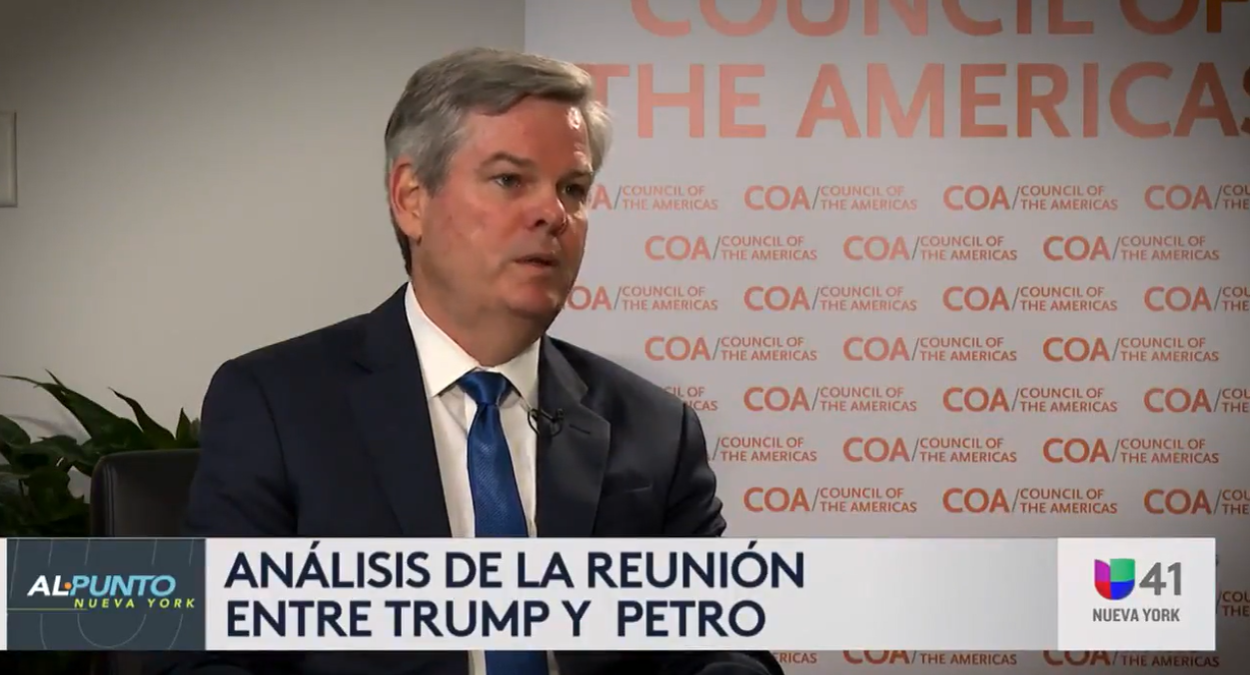Congressional Testimony: The Strategic Importance of the Western Hemisphere
Congressional Testimony: The Strategic Importance of the Western Hemisphere
COA Vice President Eric Farnsworth explains the value of sustained U.S. engagement with Latin America.
HEARING BEFORE THE U.S. HOUSE OF REPRESENTATIVES COMMITTEE ON FOREIGN AFFAIRS
SUBCOMMITTEE ON THE WESTERN HEMISPHERE
FEBRUARY 3, 2015
ERIC FARNSWORTH
VICE PRESIDENT
COUNCIL OF THE AMERICAS
*** As Delivered ***
Good morning, Mr. Chairman, Mr. Ranking Member, and Members. Thank you for the opportunity to testify. May I first congratulate you, Mr. Chairman [Duncan, R-SC], on taking over the leadership of this Subcommittee and also thank Mr. Salmon [R-AZ] for your previous Chairmanship. May I also thank you, Mr. Sires [D-NJ], for your continued commitment to these issues as the Ranking Minority Member. Mr. Meeks [D-NY], we are delighted to have you back, as well. On behalf of the Council of the Americas, we are looking forward to working with you and all the other members of this Subcommittee to promote U.S. national interests during this very intensive and fluid moment in hemispheric affairs.
Mr. Chairman, Mr. Ranking Member, I would submit to you that strategic U.S. interests in the Western Hemisphere are as profound as our interests almost anywhere else on the globe. The region is directly connected to our own day-to-day well-being, from economic prosperity and growth to national and energy security and promotion of our most fundamental values.
Let’s be clear-eyed about this: our most immediate neighbors have the greatest impact on our strategic interests. It is significant and consequential that we have a northern neighbor, Canada, which is both our top trade partner and top energy supplier, and which is stalwart in working with us to address the toughest global challenges. At the same time, North America including Mexico—our second largest export market and also third largest energy supplier—is becoming a fully integrated production platform, with tightly-knit supply chains and ever-deepening commercial ties. As China and other nations have emerged to challenge the pre-existing global economic order, the ties that bind us within North America have created economic efficiencies, built competitiveness, and directly contributed to the economic growth our citizens both desire and deserve. The challenges that Mexico continues to face on the security side are also our concern, because they undermine the rule of law, vacuum up resources, and have the potential to spill over onto us. It is therefore critically important that we get relations with our two most immediate neighbors right.
Beyond North America, it is profoundly in the self-interest of the United States to see a hemisphere where every nation is, in Vice President Biden’s words, middle class, democratic, and secure. These are precisely the characteristics that define our best, longest-lasting, most effective global partnerships. It is also why we believe so strongly that trade and investment expansion in the Western Hemisphere is a strategic issue.
In the first instance, trade and investment supports our own economic strength and security, as the President noted during his State of the Union address in January.
Ms. Ros-Lehtinen [R-FL] has already given us a number of important statistics which I won’t repeat. At the same time, trade and investment also support efforts to build and strengthen middle classes abroad, breaking down traditionally restrictive patterns of economic organization and offering greater opportunities to grow and innovate supported by the rule of law. Formal trade agreements reinforce these activities, while linking our economies closer together on a more permanent basis consistent with U.S. values. We can do more, and we should, and I have several specific ideas in my written testimony.
Nonetheless, while regional economic progress over the past decade is noteworthy, continued success is not guaranteed. The dramatic fall in oil prices is already straining regional economies and reducing the growth on which continued poverty reduction depends. Hydrocarbons are plentiful across the Western Hemisphere, directly supporting U.S. energy security, but petroleum-dependent nations like Venezuela and its client states in the Caribbean Basin among others are now in deep economic trouble, having squandered immense wealth generated during the past decade of high energy prices. And there is perhaps nothing more motivating for dramatic, even radical political change that fosters populism—or potentially worse—than fear and prospects for economic stagnation or retrenchment. One needs look no further than the recent Greek elections to reinforce the point.
It is therefore also in our strategic interests to promote broad-based economic growth in Central America and the Caribbean, and there is a significant role here for Congress. As we were starkly reminded by the summer 2014 crisis of unaccompanied minors on our Southwestern border, most who came from Central America, families will take desperate measures when their livelihoods are at stake and their personal security and the rule of law cannot be guaranteed. These issues are interconnected, significantly exacerbated if not caused by the illegal drug trade and gang culture in a number of countries. That’s one reason why it is so important that we have full economic and security cooperation with both the drug transit and drug producing nations, including across the full range of cybercrime law enforcement, and why it is so harmful when such cooperation breaks down as we have seen with regard to Venezuela.
Beyond the pressing need to improve the personal security profile in parts of the region, however, the Western Hemisphere is, thankfully, a region largely at peace, with only the last vestiges of guerrilla conflict ongoing in Colombia. With that nation actively involved in a peace process, which the United States has done so much to enable through our active policy and financial support for the Colombian people on a bi-partisan basis, we must now begin to think in terms of supporting the peace once an agreement is struck.
Finally, Mr. Chairman and Mr. Ranking Member, let me offer a brief word about Latin America and the Caribbean in the overall global environment. No longer can we assume that we can engage solely on our own terms. We must increasingly contend for the region in a manner that we have traditionally not had to do. China’s growing presence and long term commitment is changing the economic and political dynamic. At the same time, Brazil’s rise has been universally and appropriately praised, but with its interest in developing an increasing global profile coupled with an increased capacity to realize greater ambitions, we must also recognize that Brazilian pursuit of its own foreign policy interests does not always coincide with our preferences. That’s ok—competition is good in both politics and business. But it does mean that we have to engage meaningfully with the region on a sustained and creative basis, finding ways to promote our interests effectively by working closely in partnership with others wherever we can, while recognizing the rapidly changing nature of hemispheric relations.
Thank you again Mr. Chairman and Mr. Ranking Minority Member for the opportunity to appear before you today. I look forward to your comments and questions.








